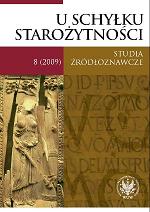SPOŁECZNOŚĆ NEAPOLU WOBEC WOJSK BELIZARIUSZA W 536 ROKU – KLASYCZNA POLITYKA MIEJSKA CZY LITERACKA STYLIZACJA PROKOPIUSZA?
THE COMMUNITY OF NAPLES AND THE ARMY OF BELISARIUS IN AD 536 – CLASSICAL MUNICIPAL POLITICS OR PROCOPIUS’S LITERARY STYLISATION?
Author(s): Adam IzdebskiSubject(s): History
Published by: Wydawnictwo Naukowe Sub Lupa
Keywords: Neapol; Belizariusz; Prokopiusz; źródło historyczne
Summary/Abstract: As there are only a few sources for the study of city politics in late antique Italy, each existing account needs to be analysed exhaustively before any conclusions could be drawn. This is especially the case of a narrative of the siege of Naples, particularly rich in detail, written by Procopius (Wars v:8). The aim of the article is to establish the extent to which he stylised himself at Thucydides – and therefore, how much actual information is conveyed by his account. At first, the reasons for describing this episode are investigated, revealing Belisarius’s interests in propagating a positive image of these ferocious events. This analysis is followed by a meticulous comparison of Procopius’s Naples account with Thucydides’s narrative of the siege of Plateia, showing that for Procopius following his great predecessor meant rather thinking like him than just copying his text. Then, the use of the words demos, politai and plethos in Procopius’s writings is analysed; thus it is proved that in the eyes of the historian the only way to force the city to open its gates was to persuade the majority of its inhabitants to this decision. Finally, having compared the events in Naples to the situation of the rest of Italy at the eve of the Justinian’s re-conquest, one may conclude that in 536 AD urban politics in this important Western Mediterranean city followed traditional pattern in which decisions were reached through persuading the majority of inhabitants through open debate.
Journal: U schyłku starożytności - Studia źródłoznawcze
- Issue Year: 2009
- Issue No: VIII
- Page Range: 33-50
- Page Count: 18
- Language: Polish

